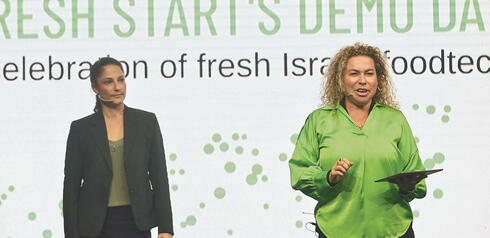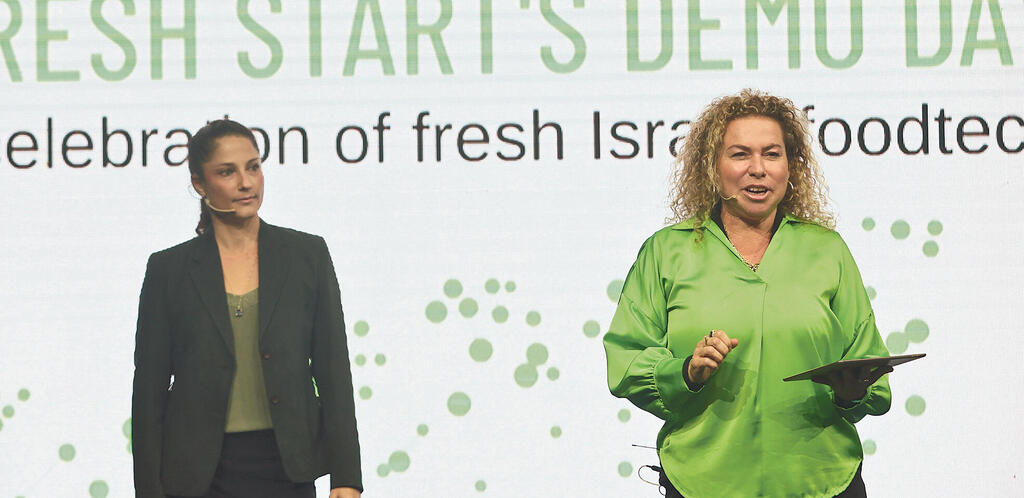
Israeli startups leading the way in cutting edge foodtech innovation
Alteco.io, Blue Tree, Bountica, Eggmented Reality, Pigmentum, ProFuse Technology, Sea2Cell, and Sweet Balance starred in the recent Demo Day held by local foodtech incubator Fresh Start
"We saw the high-tech bubble inflate and burst," said Noga Sela Shalev, CEO of the Fresh Start foodtech incubator, at Fresh Start's Demo Day event earlier this week. "Of course we must be worried about what will come next. But this may be the right time for new opportunities and this is the best place to find them."
"We live the food industry," added Tammy Meiron, CTO of the incubator. "As an incubator, we go through hundreds of companies, find the best ones and make sure to provide them with the resources needed for growth. We offer unparalleled mutual support."
The highlight of the event saw eight startups present their developments.
Eggmented Reality
An egg without a nest
A continuous supply of proteins to the food industry is very important, but today people are interested in eating proteins of high nutritional value that are not of animal origin. Eggmented Reality is building a platform for the production of proteins for the food industry, and producing them in a process that reduces the risk of foodborne diseases (e.g. salmonella), environmental pollution, water consumption and animal abuse. Eggmented's products are not genetically modified and are reduced in allergens. The company started operating this year, in Kiryat Shmona, and employs six people.
"We are on the verge of a food crisis," said John Rathhauser, the company's co-founder and “Chief Egg Officer” (CEO). "We are moving towards food produced from plants and in the laboratory, but this results in cheese that does not stretch and cookies that crumble by hand. Instead of asking 'how do we create an cheese without a cow or an egg without a chicken?', we are looking for components that are identical in quality to the proteins that exist today. We produce them using precision fermentation. We use fewer components to achieve the same result."
Bountica
The proteins of the future
Bountica also develops innovative proteins, which will be used for the development of the next generation of food preservatives as well as for a variety of other applications. The company produces them in a natural and environmentally friendly process.
"What do we know about the preservative E210? It is flammable and creates rust," explained Fabian Trumper, CEO and co-founder of Bountica. "What sane person would eat that? It turns out that 75% of our foods contain artificial preservatives. What if we replaced preservatives with proteins? When I saw our results, I was amazed. I knew we were on the right track. We used drug discovery tools to find proteins that can protect perishable foods and beverages. I believe that soon we won't have to decide between healthy food and food with a long shelf life."
Sea2Cell
Cultured fish
Sea2Cell develops a unique technology for the production of cultured fish meat, and does this in huge tanks, in contrast to fish grown in ponds or in the sea. There is a difficulty in satisfying the rising demand for fish, therefore the prices are rising, and what's more - many species of fish are in danger of extinction. Therefore, there is a connection between the business opportunity and the ecological opportunity.
"The world is eating more and more products from the sea," explained Dr. Orna Harel, CEO and co-founder of the company. "The food supply from the sea is in danger, and aquaculture is not a solution either. In the production of cultured meat, even under good conditions, there are biological barriers, and we use genetic engineering and genetic editing to create super cells. This technology will allow the fish to grow faster, and the whole operation is expected to be cheaper."
Pigmentum
The plants become a food factory
Pigmentum has developed a technology that turns plants into factories for the production of valuable components such as proteins and flavorings, color, fragrance and more for the food, cosmetics and life sciences industries. The company's technology optimizes the production of materials and the crops obtained from the plants through a unique fertilizer that is added to the irrigation system and activates genetic mechanisms in the plants and creates pigmentation in them, turning them into a sort of protein factory. The company is now focusing on the creation of casein proteins, the main component of milk and important for creating cheeses. "Our food systems must find sustainable ways to feed the world," said Tal Lutzky, CEO and co-founder of the company.
ProFuse Technology
To produce meat quickly and cheaply
With the amount of meat that humans will consume expected to double by 2050, there is a need for a revolution in the way meat is produced. The solution: cultured meat that is grown only from cells. ProFuse develops a breakthrough technology that enables the production of cheap, high-quality and nutritious cultured meat. The company has been operating in Kiryat Shmona since 2021 and employs about ten employees.
Tamar Eigler-Hirsh, CTO and co-founder of ProFuse, said: "Many people do not understand that the world is at a critical point. There are several challenges to cultured meat. The first is to produce meat without animals, and the second is that the meat must be nutritious and tasty. The meat should also be faster and cheaper. This is where ProFuse’s technology comes into play. Our cocktail supplement can make cells grow in half the time."
Sweet Balance
Uncompromising sugar substitute
Sweet Balance develops a natural sugar substitute, which enables a significant reduction of sugar in food and beverage products, without affecting the taste.
"We all want to reduce sugar, but in the supermarket there are many red labels," said Yoav Dagan, the company's CEO. "Why does sugar continue to be such a common ingredient? Because it has many functions. It not only has a taste, but it improves the texture and stabilizes the product. Second, if the taste of the sweetener is not good enough, everything else is irrelevant. Ultimately, the consumers want a natural and inexpensive product. We have intellectual property that allows us to produce sweeteners with 80% less sugar and without compromising on taste."
Alteco.ai
Food production without wasting energy
Alteco is changing the management of electricity in food production using a unique technology to identify consumers in the electricity network. All this without the need to install dedicated hardware. Locating energy waste improves production processes, identifies opportunities for energy savings and helps with preventive maintenance. The company's management has already accompanied several companies, factories, municipalities and other bodies in consulting for energy efficiency, and thus found the common denominator for all of them: it is very difficult to manage energy consumption data in large organizations. Most of them are not interested in making massive investments. To be truly efficient, it is necessary to control the information and make sure that the information is available all the time, from a single measurement point. Alon Mashkovich, CEO and co-founder of Alteco, compared the company's technology to the Shazam application. "Just as Shazam recognizes songs that are played in space, we recognize devices that work and provide an efficient solution for operation. We were able to identify more than 20 devices from a single point, thus predicting malfunctions in advance."
Blue Tree
Natural juice with less sugar
A glass of squeezed orange juice contains an excessive amount of sugar, almost ten teaspoons. The Blue Tree company has developed a technology by which the sugar can be "pulled out" in a way that preserves the naturalness of the juice, and especially the taste. These days the company is planning a sugar reduction system at the Priniv juice factory, in preparation for the marketing of squeezed orange juice with reduced sugar in Israel. "Think about your children's diet," said Michael Gordon, CEO of Blue Tree. "Does it include natural drinks? Sometimes it is a product with healthy ingredients, but one glass has the same amount of sugar as Coca-Cola. This is where our technology comes into play."














